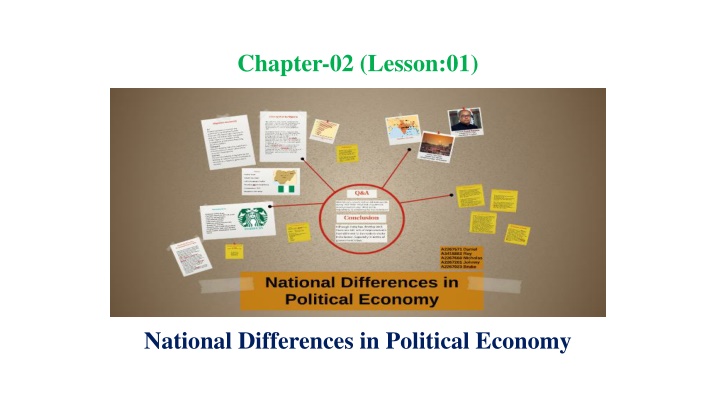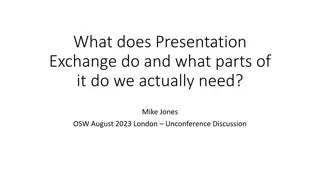
National Differences in Political Economy
Explore the political, economic, and legal systems that shape a country's political economy and how these differences impact international business. Learn about collectivism, individualism, democracy, totalitarianism, market economy, command economy, and mixed economy.
Download Presentation

Please find below an Image/Link to download the presentation.
The content on the website is provided AS IS for your information and personal use only. It may not be sold, licensed, or shared on other websites without obtaining consent from the author. If you encounter any issues during the download, it is possible that the publisher has removed the file from their server.
You are allowed to download the files provided on this website for personal or commercial use, subject to the condition that they are used lawfully. All files are the property of their respective owners.
The content on the website is provided AS IS for your information and personal use only. It may not be sold, licensed, or shared on other websites without obtaining consent from the author.
E N D
Presentation Transcript
Chapter-02 (Lesson:01) National Differences in Political Economy
Lesson Learning Objectives 1. 2. 3. 4. 5. 6. 7. 8. 9. 10. Difference in legal system 11. Differences in contact law What is political economy of a country? Political system Collectivism and individualism Democracy and totalitarianism Economic system Market economy Command economy Mixed economy Legal system
What is the political economy of a country? A country s political economy refers to its political, economic, and legal systems These systems are interdependent, and interact and influence each other A country s political system has major implications for the practice of international business This chapter will review these systems and explore how differences in political economy influence the benefits, costs, and risks associated with doing business in different countries.
Political Systems Apolitical system - the system of government in a nation Political systems can be assessed in terms of the degree to which they emphasize collectivism as opposed to individualism in terms of the degree to which they are democratic or totalitarian
Collectivism and Individualism Collectivism: A system that stresses the primacy of collective goals over individual goals- can be traced to the ancient Greek philosopher Plato today, socialists support collectivism When collectivism is emphasized, the needs of the society as whole are generally viewed as being more important than individual freedoms Socialism: Modern socialists trace their roots to Karl Marx advocated state ownership of the basic means of production, distribution, and exchange the state then manages the enterprises for the benefit of society as whole
Collectivism and Individualism In the early 20th century, socialism split into communists and social democrats communists believed that collectivism could only be achieved though revolution and totalitarian dictatorship social democrats worked to achieve the same goals by democratic means Many state-owned enterprises failed to succeed, and today, many nations are implementing privatization programs whereby state-owned enterprises to private investors. Individualism: A political philosophy that suggests individuals should have freedom over their economic and political pursuits can be traced to Aristotle who argued that individual diversity and private ownership are desirable Individualism stresses: individual freedom and self-expression letting people pursue their own self-interests to achieve the best overall good for society democratic systems and free markets
Democracy and Totalitarianism What is the difference between a democracy and totalitarianism? Democracy - political system in which government is by the people, exercised either directly or through elected representatives most common form today is representative democracy, where elected representatives vote on behalf of constituents Totalitarianism - form of government in which one person or political party exercises absolute control over all spheres of human life, and opposing political parties are prohibited
Democracy and Totalitarianism In most totalitarian regimes there is widespread political repression there are no free and fair elections media is censored basic civil liberties are denied challenges to the regime are prohibited
Democracy and Totalitarianism There are four major forms of totalitarianism today: 1. Communist totalitarianism: advocates achieving socialism through totalitarian dictatorship 2. Theocratic totalitarianism: political power is monopolized by a party, group, or individual that governs according to religious principles 3. Tribal totalitarianism: a political party that represents the interests of a particular tribe monopolizes power 4. Right wing totalitarianism:individual economic freedom is allowed but individual political freedom is restricted in the belief that it could lead to communism
Economic Systems Political ideology and economic systems are connected There are three types of economic systems: the market economy, the command economy, and the mixed economy A free market system is likely in countries where individual goals are given primacy over collective goals State-owned enterprises and restricted markets are common in countries where collective goals are dominant
Market Economy In a pure market economy the goods and services that a country produces, and the quantity in which they are produced is determined by supply and demand Consumers, through their purchases, determine what is produced and in what quantity The role of government is to encourage free and fair competition between private producers
Command Economy In a pure command economy the goods and services that a country produces, the quantity in which they are produced, and the price at which they are sold are all planned by the government All businesses are state owned, and so have little incentive to control costs and be efficient Because there is no private ownership, there is little incentive to better serve consumer needs
Mixed Economy A mixed economy includes some elements of a market economy and some elements of a command economy Governments tend to take over troubled firms that are considered to be vital to national interests The number of mixed economies in the world today is falling
Legal Systems The legal system of a country refers to the rules, or laws, that regulate behavior, along with the processes by which the laws of a country are enforced and through which redress for grievances is obtained A country s legal system is important because laws regulate business practice laws define the manner in which business transactions are to be executed laws set down the rights and obligations of those involved in business transactions
Different Legal Systems There are three main types of legal systems: 1. Common law - based on tradition, precedent, and custom found in most of Great Britain s former colonies, including the United States 2. Civil law - based on a very detailed set of laws organized into codes found in over 80 countries, including Germany, France, Japan, and Russia 3. Theocratic law - based on religious teachings Islamic law is the most widely practiced
Differences in Contract Law Question: How do common law and civil differ? The two systems approach contract law (the body of law that governs contract enforcement) in different ways a contract - specifies the conditions under which an exchange is to occur and details the rights and obligations of the parties involved In a common law state, contracts are very detailed will all contingencies spelled out In a civil law state, contracts are shorter and much less specific
Any Confusion????? Thank you so much for your nice cooperation ...






















